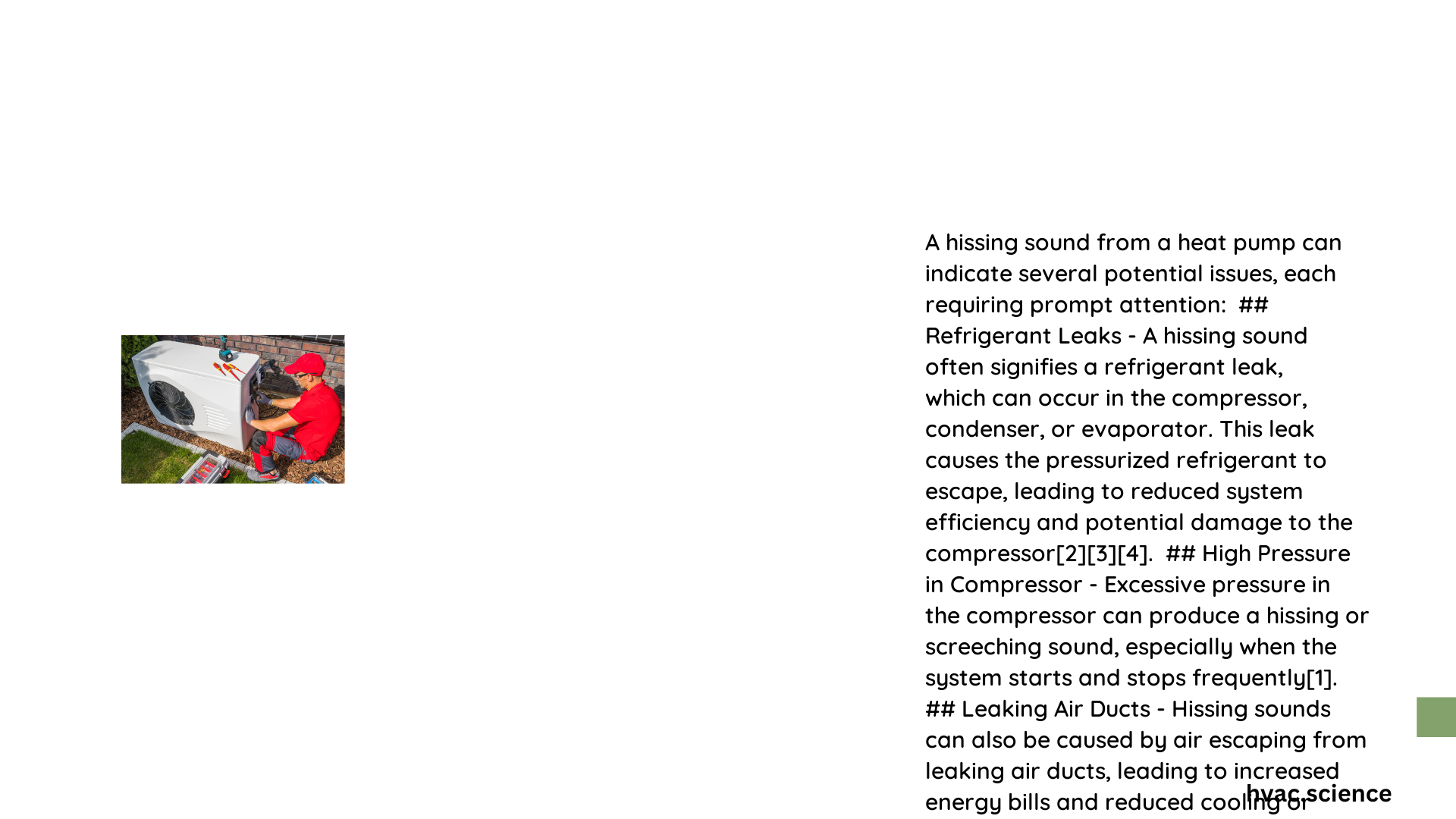A hissing sound from a heat pump can signal critical system problems ranging from minor air duct leaks to serious refrigerant escapes. These unexpected noises often indicate underlying mechanical issues that require immediate professional attention, potentially impacting your system’s efficiency, energy consumption, and long-term operational integrity. Understanding these sounds can help homeowners diagnose and address potential heat pump malfunctions before they escalate into costly repairs.
What Causes Hissing Sounds in Heat Pumps?
Are Refrigerant Leaks the Primary Culprit?
Refrigerant leaks represent one of the most common sources of hissing sounds in heat pumps. When pressurized refrigerant escapes through small openings, it creates a distinctive high-pitched hissing noise. This phenomenon occurs as the refrigerant transitions from a high-pressure liquid to a lower-pressure gas.
Key Indicators of Refrigerant Leaks
- Persistent hissing sounds near the outdoor unit
- Reduced cooling or heating performance
- Increased energy consumption
- Warm air blowing from vents
| Leak Severity | Symptoms | Potential Damage |
|---|---|---|
| Minor Leak | Occasional hissing | Reduced efficiency |
| Moderate Leak | Consistent hissing | Compressor strain |
| Major Leak | Loud, prolonged hissing | Complete system failure |
Can Air Duct Problems Cause Hissing?
Air duct issues frequently contribute to hissing sounds in heat pump systems. Gaps, cracks, or tears in ductwork allow conditioned air to escape, producing high-pitched whistling or hissing noises from vents.
Diagnostic Steps for Duct-Related Hissing
- Inspect visible ductwork for physical damage
- Listen for whistling sounds near vents
- Check for temperature inconsistencies in different rooms
- Measure airflow volume and pressure
Do Mechanical Components Create Hissing Noises?
Several mechanical components can generate hissing sounds:
- Compressor Pressure Issues: High internal pressure can cause short-duration hissing or screeching
- Faulty Reversing Valve: Specific to heat pumps, a stuck valve can produce persistent hissing
- Worn Seals and Gaskets: Deteriorating components might create intermittent hissing sounds
How to Diagnose and Resolve Hissing Sounds?
Professional Troubleshooting Techniques
- Turn off the heat pump immediately
- Conduct visual and auditory inspections
- Use specialized leak detection tools
- Measure system pressures and temperatures
- Evaluate electrical component functionality
What Are Repair Costs and Considerations?
Repair expenses vary based on the specific issue:
– Refrigerant leak repair: $100 – $500
– Duct sealing: $300 – $1,000
– Compressor replacement: $1,000 – $3,000
– Reversing valve replacement: $500 – $1,500
When Should You Call a Professional?
While some minor issues can be self-diagnosed, complex heat pump problems require professional intervention. Certified HVAC technicians possess the expertise, tools, and knowledge to accurately diagnose and repair hissing sound issues.
Preventive Maintenance Tips

- Schedule annual professional inspections
- Replace air filters regularly
- Monitor system performance
- Address unusual sounds promptly
- Maintain consistent system cleaning
Conclusion
Hissing sounds from heat pumps should never be ignored. They often indicate underlying issues that can compromise system efficiency and lead to expensive repairs. Prompt diagnosis and professional intervention are crucial to maintaining your heat pump’s optimal performance.
